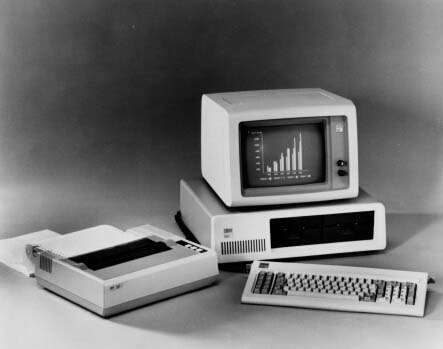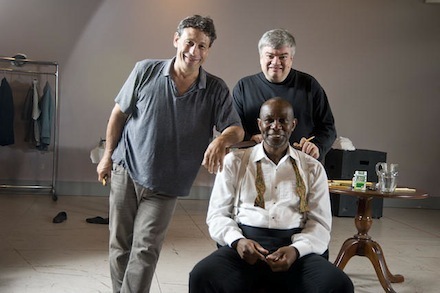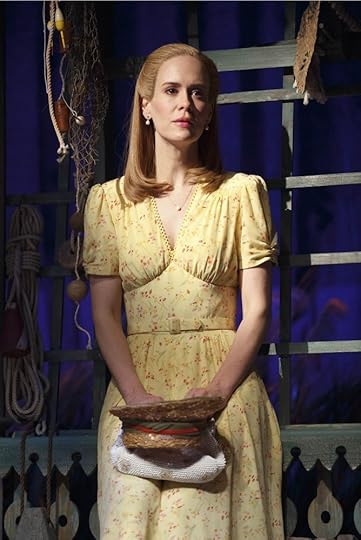Terry Teachout's Blog, page 94
March 17, 2013
TT: Almanac
Paul Taylor, Facts and Fancies: Essays Written Mostly for Fun
TT: Just because
(This is the latest in a series of arts-related videos that appear in this space each Monday and Wednesday.)
TT: And yet so far
 Drama critics see shows free, and they're normally given two aisle seats to every show that they see. This is--usually--a fabulous perk, especially for me. Nowadays I spend so much time on the road that I scarcely ever get to see my New York-based friends save by taking them to a play or a musical, after which we grab a bite to eat and catch up.
Drama critics see shows free, and they're normally given two aisle seats to every show that they see. This is--usually--a fabulous perk, especially for me. Nowadays I spend so much time on the road that I scarcely ever get to see my New York-based friends save by taking them to a play or a musical, after which we grab a bite to eat and catch up.Because I'm seeing a lot of shows in Manhattan for the first time in several months, I'm catching up with a lot of friends whom I haven't seen in a like amount of time, if not longer. Mrs. T informed me the other day that we spent more nights out of town than in our New York apartment in 2012. As a result, I've been seeing friends in recent days--good ones, too--whom I last saw a year ago.
Those of you who read this blog regularly will know about much, if not all, of what happened to me in the past twelve months. The death of my mother, my first stay at the MacDowell Colony, three back-to-back productions of Satchmo at the Waldorf, the completion of my Duke Ellington biography...that's quite a bit of catching-up to pack into a single evening. As Jeff Bridges says to Beau Bridges in The Fabulous Baker Boys, "Lotta water."
On the other hand, it's also true that you do know about these things, thanks to this blog and the other social media, on which I regularly describe my current doings in some detail. So do my friends, most of whom follow me on line and with whom I also stay in more direct touch via e-mail, my schedule being too erratic for me to spend much time on the phone.
 All of which makes me wonder whether the nature of friendship itself has changed in the age of the internet. Our Girl in Chicago, my best friend, moved away from New York a couple of decades ago, and since then she's only been back in town for a day or two at a time. Yet we've maintained the closeness of our friendship without apparent effort, in part because her move to Chicago coincided with the emergence of e-mail. I actually gave OGIC her very first dial-up modem as a present. We were already good friends when she left New York, but it was then, not before, that we became truly close, and it happened on line.
All of which makes me wonder whether the nature of friendship itself has changed in the age of the internet. Our Girl in Chicago, my best friend, moved away from New York a couple of decades ago, and since then she's only been back in town for a day or two at a time. Yet we've maintained the closeness of our friendship without apparent effort, in part because her move to Chicago coincided with the emergence of e-mail. I actually gave OGIC her very first dial-up modem as a present. We were already good friends when she left New York, but it was then, not before, that we became truly close, and it happened on line.It was around the same time, in 1993, that I stopped going to an office and started working at home. After I did that, I no longer saw anyone outside of my immediate family on a routine, day-to-day basis. Like most apartment dwellers, I don't know the people in my building other than casually, and once I started traveling for The Wall Street Journal, I simply wasn't around often enough to get on closer terms with my neighbors.
 This is a radical change from the way I lived prior to moving to New York. The small-town neighborhood in which I grew up, and in which my brother still lives, was very closely knit. We knew everybody on our block. When I was in college, most of my friends were people whom I saw every day. Now none of them is.
This is a radical change from the way I lived prior to moving to New York. The small-town neighborhood in which I grew up, and in which my brother still lives, was very closely knit. We knew everybody on our block. When I was in college, most of my friends were people whom I saw every day. Now none of them is.The social media have made it much easier for me to stay in touch with good friends whom I don't see regularly. And while I only "friend" people on Facebook whom I already know, Twitter is a different story. I've become "real-time" friends with a number of people whom I originally "met" through Twitter. Nor are my latter-day friendships in any way shallow: they feel as close to me as the friendships of my now-distant youth.
That said, I can't help but recall the sheer palpability of those youthful friendships. I've told Our Girl more than once that I wish we lived in the same building, or even the same neighborhood (which has never been the case, even when she lived in New York). Perhaps the intensity of our friendship is heightened by the fact that we see one another so infrequently. Perhaps, too, the social media are a fully adequate substitute for the dailyness of old-fashioned can-I-borrow-a-cup-of-sugar friendship.
 Perhaps--but somehow I doubt it, which may be one of the reasons why I've taken so strongly to working in the theater. Theatrical friendships, to be sure, tend to be short-lived, off-and-on affairs, but when you're working on a show, you see the same people day after day, and the intimacy that arises from that physical ubiquity is a thing unto itself.
Perhaps--but somehow I doubt it, which may be one of the reasons why I've taken so strongly to working in the theater. Theatrical friendships, to be sure, tend to be short-lived, off-and-on affairs, but when you're working on a show, you see the same people day after day, and the intimacy that arises from that physical ubiquity is a thing unto itself.I felt the same way at the MacDowell Colony. It was the first time in years that I'd seen the same group of people each day, and I loved knowing that we'd all be together at dinner, and that I could spend time with them at will rather than having to go out of my way to arrange meetings. One of my fellow colonists--a Manhattanite, naturally--liked it so much that she actually fantasized about starting a commune when she got back home.
Mrs. T, who knows me better than anyone else, thinks that I have a particular gift for immediate intimacy, a knack for flinging the doors wide at will. True or not, I know that I've never felt lonely in New York, a city that is famous (in E.B. White's words) for bestowing on its inhabitants "the gift of loneliness and the gift of privacy." But I know, too, that there are other ways to live, and as I grow older, I find that I miss them more than I ever thought I would.
March 15, 2013
COPYRIGHT PROTECTION THAT SERVES TO DESTROY
March 14, 2013
TT: Hoping against hope
* * *
Lanford Wilson walked a fine line between sentiment and sentimentality. In "Talley's Folly," the story of two no-longer-young people who can't quite manage to fall in love, he stayed on the right side, and the results of his restraint were profitable in every way. Not only did the play, which opened Off Broadway in 1979, move uptown and run for 286 performances, but it won Mr. Wilson a Pulitzer Prize. Now "Talley's Folly" is receiving its first major New York production since 1980. No, it's not on Broadway--the Roundabout Theatre Company is mounting the play at the Laura Pels Theatre, its Off-Broadway house--but it ought to be. Danny Burstein and Sarah Paulson give solid-sterling performances, while Michael Wilson's staging is scrupulously and rewardingly attentive to the script....
 Mr. Burstein, who made a deep impression in the Broadway revivals of "Follies" and "Golden Boy," does it again here, giving a performance that invites your sympathy without begging for it. Ms. Paulson is, if possible, better still, the very model of an inhibited woman (her close-to-the-chest body language tells the story in a glance) who longs to be something other than what she is....
Mr. Burstein, who made a deep impression in the Broadway revivals of "Follies" and "Golden Boy," does it again here, giving a performance that invites your sympathy without begging for it. Ms. Paulson is, if possible, better still, the very model of an inhibited woman (her close-to-the-chest body language tells the story in a glance) who longs to be something other than what she is....Three of Amy Herzog's last four plays, "After the Revolution," "4000 Miles" and "The Great God Pan," have been seen in New York since 2010, and the original production of "Belleville," which was produced two years ago by the Yale Repertory Theatre, has just transferred to the New York Theatre Workshop. It confirms my conviction that Ms. Herzog is America's most interesting young playwright. I would have said "promising," but that word no longer applies. At 33, she is a fully formed artist with impressively smart things to say about the tone and texture of contemporary American life....
A.R. Gurney, the reigning poet laureate of WASP self-doubt, has revised "The Old Boy," first seen in New York in 1991, for a revival by Keen Company, one of New York's best Off-Broadway troupes. It's a prep-school tale with a modern twist in which a slick New England politician (Peter Rini) finds out that one of his best prep-school buddies (Chris Dwan) was a homosexual who left his wife (Marsha Dietlein Bennett), developed AIDS and killed himself. Mr. Gurney has turned their three-cornered relationship into a very well-made play--all the corners are tucked in with the utmost neatness--that suggests an American version of one of Terence Rattigan's stiff-upper-lip dramas of British middle-class angst....
* * *
Read the whole thing here .
A trailer for the original Yale Rep production of Belleville:
TT: Catching an echo
* * *
What is a library? Until fairly recently, the answer to that question was simple: It's a storehouse for pieces of the past, reduced to words printed on paper. The fact that books are increasingly "printed" on something other than paper doesn't change the fundamental purpose of libraries. They are our collective memory. Without books and the libraries that preserve them, we wouldn't know what happened in the past, and we couldn't use that knowledge to shape the future.
 Fortunately for posterity, a well-made book isn't hard to preserve. But in 1877, Thomas Edison invented a new way to preserve pieces of the past. He called it the phonograph, and it took a long time for librarians to figure out that the echoes of speech and music that Edison and his successors etched on discs were as important a part of our collective memory as the words that Johannes Gutenberg and his successors printed on paper.
Fortunately for posterity, a well-made book isn't hard to preserve. But in 1877, Thomas Edison invented a new way to preserve pieces of the past. He called it the phonograph, and it took a long time for librarians to figure out that the echoes of speech and music that Edison and his successors etched on discs were as important a part of our collective memory as the words that Johannes Gutenberg and his successors printed on paper.Nowadays most people understand the historical significance of recorded sound, and libraries around the world are preserving as much of it as possible. But recording technology has evolved much faster than did printing technology--so fast, in fact, that librarians can't keep up with it. It's hard enough to preserve a wax cylinder originally cut in 1900, but how do you preserve an mp3 file? Might it fade over time? And will anybody still know how to play it a quarter-century from now?...
The Library of Congress recently issued a 78-page document called "The Library of Congress National Recording Preservation Plan" whose purpose is to ensure that our descendants will be able to listen to the sounds of the past long after we're dead and gone. It contains 32 recommendations, most of which, I suspect, will be filed and forgotten. Given the present state of the economy, I can't imagine that anyone on Capitol Hill sees the preservation of sound recordings as a top priority. But Congress can do one important thing that will help to save our sonic history without costing a cent: We need to straighten out America's confused copyright laws, and we need to do it now....
* * *
Read the whole thing here .
TT: Almanac
Edith Wharton, A Backward Glance
March 13, 2013
TT: So you want to see a show?
Here's my list of recommended Broadway, off-Broadway, and out-of-town shows, updated weekly. In all cases, I gave these shows favorable reviews (if sometimes qualifiedly so) in The Wall Street Journal when they opened. For more information, click on the title.
BROADWAY:
• Annie (musical, G, reviewed here)
• Once (musical, G/PG-13, nearly all performances sold out last week, reviewed here)
OFF BROADWAY:
• All in the Timing (comedy, PG-13, closes Apr. 14, reviewed here)
• Avenue Q (musical, R, adult subject matter and one show-stopping scene of puppet-on-puppet sex, reviewed here)
• Donnybrook! (musical, G/PG-13, suitable for children capable of enjoying a love story, closes Apr. 28, reviewed here)
• The Fantasticks (musical, G, suitable for children capable of enjoying a love story, reviewed here)
• The Madrid (drama, PG-13, closes May 5, reviewed here)
• Passion (musical, PG-13, closes Apr. 14, reviewed here)
• The Revisionist (drama, PG-13, closes Apr. 21, reviewed here)
IN LOS ANGELES:
• Tribes (drama, PG-13, remounting of original off-Broadway production, closes Apr. 14, original production reviewed here)
IN SARASOTA, FLA.:
• You Can't Take It With You (comedy, G, closes Apr. 20, original production reviewed here)
CLOSING SATURDAY IN ORLANDO, FLA.:
• Othello (Shakespeare, PG-13, reviewed here)
TT: Almanac
Edith Wharton, The Age of Innocence
March 12, 2013
TT: Almanac
Edith Wharton, Sanctuary
Terry Teachout's Blog
- Terry Teachout's profile
- 45 followers



